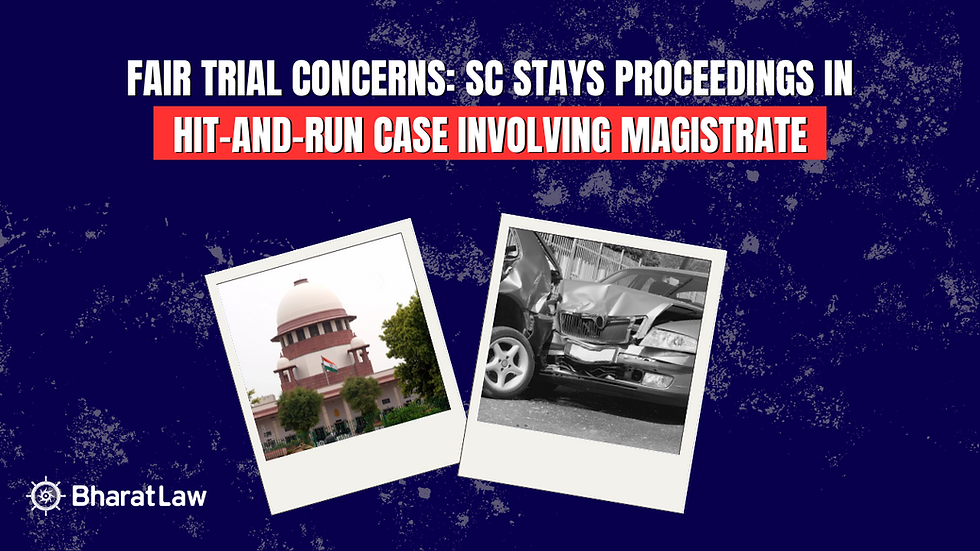The Law Favours the Diligent, Not the Indolent – Supreme Court Rejects Unjustified Delay in Setting Aside Ex-Parte Decree
- Chintan Shah

- Mar 4, 2025
- 4 min read
Summary of the Judgment
Case Name: K. Ramasamy v. R. Nallammal & Others
Date of Judgment: 3rd March 2025
Court: Supreme Court of India
Judges: Hon’ble Justice Sudhanshu Dhulia and Hon’ble Justice K. Vinod Chandran
Advocates:
Appellant: Sri Dama Seshadri Naidu, Senior Advocate
Respondents: Sri Gopal Shankarnarayanan, Senior Advocate
Acts & Sections Involved:
Specific Relief Act, 1963
Code of Civil Procedure, 1908 (Order IX Rule 13)
Limitation Act, 1963
Cited Judgments:
Collector, Land Acquisition, Anantnag & Anr. v. Mst. Katiji & Ors., (1987) 2 SCC 107
H. Dohil Constructions Company Pvt. Ltd. v. Nahar Exports Ltd., (2015) 1 SCC 680
Background of the Case
The case concerns a specific performance suit where an ex-parte decree was passed on 13th April 2016 in favour of the plaintiff (now appellant) due to the non-appearance of the defendants. The legal representatives of the deceased first defendant sought to set aside this decree through an application filed on 4th January 2020—after a delay of 1312 days. The High Court condoned the delay and allowed the application. However, this decision was challenged before the Supreme Court by the plaintiff.
Key Issues Before the Supreme Court
Was the delay of 1312 days justified, and did it warrant condonation?
Did the High Court err in reversing the Trial Court’s refusal to set aside the ex-parte decree?
Did the defendants establish sufficient cause for their failure to contest the original suit?
Revisiting the Doctrine of Delay and Laches
The Supreme Court scrutinised the reasoning adopted by the High Court, which relied on Mst. Katiji and H. Dohil Constructions. It reiterated that:
“The law favours the diligent and not the indolent.”
While acknowledging the principle that procedural technicalities should not defeat substantive justice, the Court observed that the delay must still be explained satisfactorily. It held that the respondents failed to establish that the delay was non-deliberate.
Lack of Diligence on Part of the Defendants
The Court noted several inconsistencies in the defendants' submissions:
The first defendant had appeared in the trial court but failed to file a written statement, which led to the ex-parte decree.
His legal representatives appeared in the execution proceedings in 2018, proving that they had knowledge of the decree much earlier.
The explanation that their lawyer misplaced the case files was deemed unconvincing as they could have obtained certified copies from court records.
“The explanation provided is not sufficient cause but an afterthought.”
Equitable Considerations and Balance of Hardship
The respondents argued that the sale agreement was collusive, and the first defendant had already cancelled the power of attorney. They further contended that the property’s market value had appreciated significantly, making specific performance inequitable. However, the Supreme Court dismissed these arguments, holding that:
The plaintiff had deposited the balance sale consideration at the time of filing the suit, demonstrating readiness and willingness.
Equitable jurisdiction cannot be exercised merely on the basis of market fluctuations.
A decree holder’s rights cannot be negated due to the negligence of the judgment debtor.
“Substantial justice must always override procedural lapses, but not when the delay is deliberate and unjustified.”
Analysis of the High Court’s Condonation of Delay
The Supreme Court examined the rationale provided by the High Court for condoning the 1312-day delay. The High Court had relied on Collector, Land Acquisition, Anantnag & Anr. v. Mst. Katiji & Ors. to hold that procedural delays should not obstruct substantive justice. However, the Supreme Court distinguished this case, stating:
“While a liberal approach is warranted in condoning delay, such leniency cannot extend to cases where the delay is unexplained or deliberate.”
The Court found that the respondents had full knowledge of the decree but chose not to act until much later. The fact that they participated in execution proceedings in 2018 but filed the setting-aside application only in 2020 indicated clear negligence rather than genuine hardship.
Lack of Bona Fides in the Respondents’ Defence
The respondents contended that the agreement to sell was collusive and executed without the first defendant’s consent. They claimed that the first defendant had cancelled the power of attorney upon discovering the sale agreement. However, the Court observed:
The first defendant never contested the suit despite being aware of it.
No formal challenge was raised against the power of attorney before his death.
The respondents did not file a suit for cancellation of the agreement, which they could have done if they believed it was fraudulent.
Supreme Court’s Decision
After analysing the evidence, the Supreme Court set aside the High Court’s order and restored the Trial Court’s decision. Key rulings include:
Delay of 1312 days was unjustified and the explanation provided was not credible.
The High Court erred in condoning the delay without properly assessing the conduct of the respondents.
The plaintiff’s right to specific performance was upheld as the respondents failed to demonstrate hardship.
The appeal was allowed, and the execution of the decree was reinstated.
“The application to set aside the ex-parte decree was only an afterthought and purely experimental.”
Conclusion
This judgment reaffirms that delay must be justified with cogent reasons, especially in civil disputes involving property rights. The ruling serves as a strong precedent for protecting decree holders from unnecessary litigation delays. It reinforces the principle that while courts may exercise equitable jurisdiction, equity cannot be extended to those who fail to exercise due diligence.



Comments